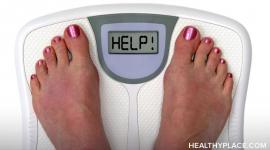What Does Eating Disorder Recovery Look Like?

Eating disorder recovery can seem like an impossible goal to some, but with professional help, eating disorders can be successfully treated. Successfully recovering from an eating disorder requires various types of eating disorder treatment depending on individual circumstances. Therapy, medication, support groups are all part of a treatment program.
Eating Disorder Recovery is a Lifelong Process
Some mental health professionals, and some patients recovering from eating disorders, feel recovery is a lifelong process. Recovery from eating disorders is seen like recovery from addictions: once an addict, always an addict. Someone with binge eating disorder may be considered "addicted to food."
There are several reasons why recovering from eating disorders is associated with the addiction model. Common patterns between eating disorders and addiction include:1
- Feeling a loss of control over substance (food)
- Obsession with substance
- Use of substance to deal with stress and negative feelings
- Secrecy about behavior
- Continuing behavior in spite of harmful consequences
It is also noted that those with eating disorders are more likely to have substance abuse issues, so recovering from eating disorders with an addiction model may serve to treat both.
The addiction model is used by organizations like Overeaters Anonymous and Anorexics Anonymous. Terminology like, "sobriety in our eating practices," is used. These eating disorder recovery groups encourage lifelong vigilance and participation in support groups; some patients find them a useful part of eating disorder recovery.
1 Are Eating Disorders Addictions? By Karin Jasper, Ph.D. http://www.nedic.ca/resources/documents/AreEatingDisordersAddictions.pdf
Recovering from Eating Disorders Seen as Cure for an Eating Disorder
On the other hand, some professionals find the addiction model inappropriate for recovering from eating disorders. There are aspects of eating disorders recovery that are not addressed, or are possibly made worse, in the addiction model:
- Encourages "black or white" thinking: with a typical addiction, the person is either sober, or they aren't; such is not the case with eating disorder recovery. Additionally, those with eating disorders tend to already have problems with this right-or-wrong thought pattern, which often perpetuates eating disorder behavior.
- A person cannot abstain from food as they would an addicted substance. The idea of "abstaining" may encourage starvation, bingeing or purging behavior.
- Thoughts about food and body image, the person's home environment and past traumas, all common issues in eating disorder recovery, are not adequately addressed.
- Addiction criteria such as physical tolerance, dependence, and withdrawal are not observable in eating disorders.
Eating disorder treatment goals are more accurately described as normalization of eating behaviors and restoration of natural weight rather than abstaining from a specific substance. Additionally, there is no evidence to indicate that eating disorder recovery based on the addiction model is effective.
While eating disorders are often complex and may take years to successfully treat, full eating disorder recovery is entirely possible.
APA Reference
Tracy, N.
(2022, January 4). What Does Eating Disorder Recovery Look Like?, HealthyPlace. Retrieved
on 2026, January 29 from https://www.healthyplace.com/eating-disorders/eating-disorders-overview/what-does-eating-disorder-recovery-look-like


